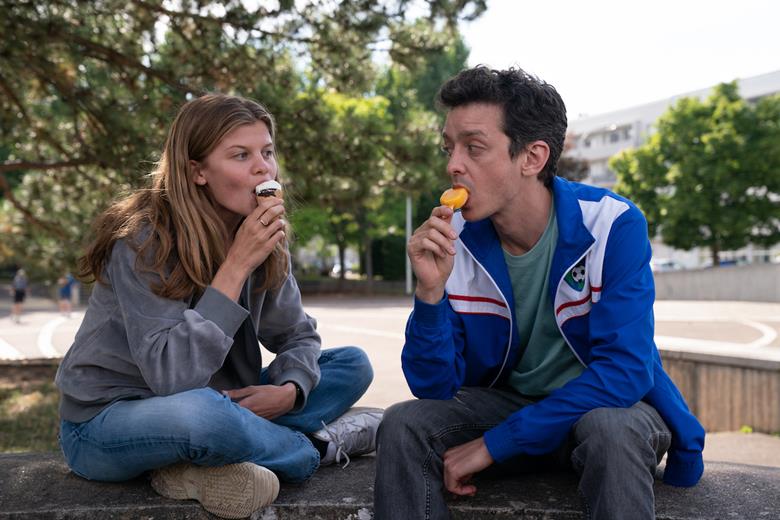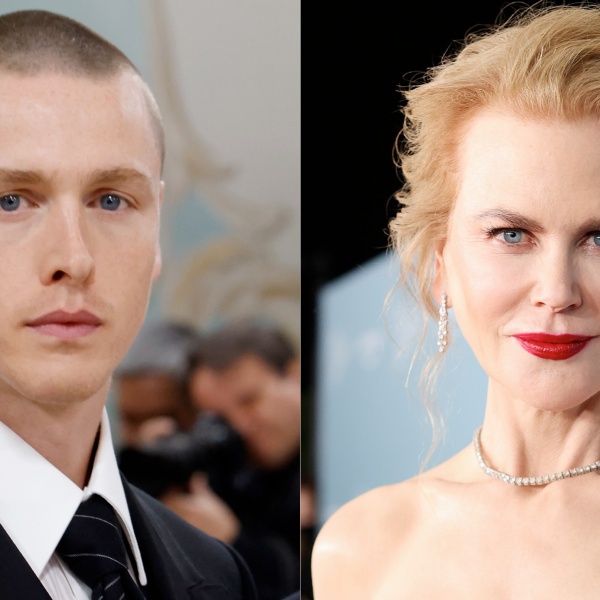There’s an irony to the title “No Love Lost”: that the gaping hole left in a lover’s wake can still shape a person’s whole existence. In short, there’s plenty lost. Erwan Le Duc (“The Bare Necessity”) writes and directs the 2023 Cannes Critics Week closing film that was billed by the festival as a “bittersweet comedy about paternity and filiation with a poetic and off-beat angle,” and delivers on most fronts.
Nahuel Pérez-Biscayart stars as Étienne, a hopeful football player who has a whirlwind romance à la “Up” with protester Valérie (Mercedes Dassy) in the first five minutes of the feature. The duo have an immediate connection after both evading the police at a demonstration, but their fearless young love (they’re in their very early twenties) soon becomes more complicated once Valérie discovers she’s pregnant. A wordless montage captures their love story up until Valérie drops off baby Rosa and Étienne at his parents’ house, promising to park the car but never returning.
Étienne moves through the various stages of mourning across years of parenting Rosa: first, he’s holding out hope, and then begins moving through the world silently, paralyzed in heartbreak. It’s only when Rosa is about age 10 or so that he addresses Valérie’s departure, putting words to the vastness of his loss.
“Absence isn’t a feeling. You can’t love someone absent,” Étienne tells Rosa who, in turn, promises to never leave him. This becomes the crux of the film once a teenaged Rosa (Céleste Brunnquell) is getting ready to depart for college, threatening to mirror in action the abandonment her own mother did.
Rosa is always moving through the world and, according to her high school boyfriend Youssef (Mohammed Louridi), symbolically running from the shadow her absent mother has left behind. Plus, it’s just more convenient for Youssef’s budding writing career to grab ahold of Rosa and Étienne’s shared “trauma” and make it his own for the sake of inspiration.
“She was your creator,” Youssef tells the father-daughter duo over dinner, citing the mark Valérie inadvertently left on them both. Yet Étienne is steadfast in viewing his trajectory differently: “My life isn’t tragic,” he responds.
And Étienne believes that. He is pulled between exploring a new love with girlfriend Hélène (Maud Wyler) and protecting Rosa’s fleeting childhood, all while their family home is being sold. Rosa encourages Étienne to show his emotions, but he is the stoic pillar of being a sole parent. While Étienne is reluctant to shed the hope he still carries for Valérie’s return, Rosa is determined to understand the mother she never knew, even at one point kissing her own father to understand Valérie’s womanhood or the pull she had on Étienne.
“No Love Lost” hinges on Wes Anderson-esque framing and lead star Pérez-Biscayart’s emotive eyes that always seem to be darting across every frame, silently searching for Valérie’s ghost in desperation for an answer to Rosa’s questioning. The quaint French film only becomes an overt physical journey to find Valérie in the last act; it’s the emotional build-up to the decision to even resurrect the idea of her that the film shines.
There may be “No Love Lost” between Étienne and Rosa, but it’s the time lost on what could have been if Valérie stayed in their lives that fuels the fodder around the shared separation anxiety between father and daughter. The presence of this absence is what writer-director Le Duc is adept at toggling, and while his latest doesn’t break the mold, like Étienne and Rosa, it really is worth sticking around for.
Rating: B-
“No Love Lost” premiered at the 2023 Cannes Film Festival. It is currently seeking U.S. distribution.




